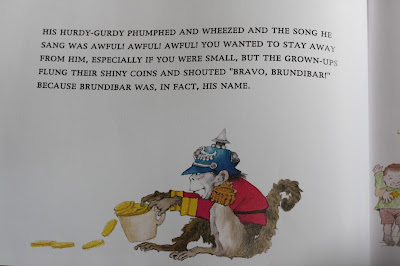Try to say this without rolling your 'r's and adopting a voice you didn't know you had:
The book's language and illustrations are unusual, to say the least, but they work. They really give the dramatic feeling of a play.


But there is something else unusual about this book, and I came upon it slowly. First I noticed that the doctor in the book had a yellow (Jewish) badge on his coat. Then I started to notice the badge in other places. I turned to the book jacket to see if it said anything about this, and it did.
"This book is based on a Czech opera of the same name ("Brundibar" is Czech slang for "Bumblebee"), with a libretto by Adolf Hoffmeister, set to music by Hans Krasa. Completed in 1938, the opera was performed fifty-five times by the children of Terezin, the Nazi concentration camp. Krasa, who was Jewish, was also imprisoned in Terezin. He was killed in Auschwitz in 1944."Now fascinated, I googled "Terezin" and "Brundibar" and came upon a video from CBS News entitled Brundibar: How the Nazis Conned the World. There I learned how music and art flourished in the concentration camp, and how "Brundibar" was the most popular show in town. The Nazis, who had begun to be questioned on what was happening to the Jews, briefly turned Terezin into a model town and produced a propaganda film highlighting a performance of Brundibar to show how well they were treating the Jews. I also learned that not only Krasa, but most of the children who acted in the opera were killed soon after in Auschwitz.
And so what seemed like an original and light-hearted children's book turned into a door into history for me. I have not passed this on to my young children. They enjoy the book simply, as it is. Some day they will know the heart-breaking history too, and appreciate the courage this book depicts that much more.
What about you? Is there a children's book that has become so much more for you? Tell me about it in the comments!

